United Airlines Ventures Sustainable Flight Fund has made a strategic investment in US low carbon fuels company Twelve, which intends using a process similar to photosynthesis to transform CO2 and water into sustainable aviation fuel using renewable energy. It follows Twelve’s recent $83 million Series C funding round and project financing for its first SAF production facility, AirPlant One, located in Moses Lake, Washington. It is expected to begin production this year, with plans to produce 50,000 gallons of SAF annually. UAV has also recently announced an investment in blended wing body (BWB) aircraft start-up JetZero, with the agreement including a path to order up to 100 airplanes and an option for an additional 100, subject to JetZero achieving development milestones, including flight of a full-scale demonstrator in 2027.
The Twelve announcement from United Airlines Ventures (UAV) did not disclose the size or nature of its investment in the company, nor whether United has agreed an offtake agreement to purchase Twelve’s E-Jet SAF. Twelve’s Series C fund raising is in addition to the $645 million it has already secured through a mix of global investors and strategic partnerships. Investor TPG Rise Climate has committed up to $400 million in project equity financing to support the development of future AirPlants.
“Scaling the SAF industry is the major hurdle air travel needs to clear in order to increase the supply and reduce the price of lower carbon fuels,” said Andrew Chang, Head of United Airlines Ventures. “Twelve has differentiated themselves through the capital they have raised and the SAF contracts they have secured, providing them with the flexibility to commercialise their technology and grow their operations expediently.”
Last year, Twelve secured one of the largest-ever SAF purchase agreements to date, a 14-year contract with International Airlines Group to supply 260 million gallons of SAF across the group’s five airlines.
Twelve – named after the carbon-12 isotope, the most abundant form of carbon on Earth – uses renewable electricity to convert CO2 and green hydrogen sourced from water into hydrocarbon fuels and chemicals via the power-to-liquid electrochemical process. Using its proprietary Opus system, the company claims its e-SAF cuts greenhouse gas emissions by up to 90% compared to conventional jet fuel, as well as significantly reducing additional air pollutants sulphur and nitrogen oxides, and particulate matter.
Nicholas Flanders, co-founder and CEO of Twelve, said the UAV investment came at a “pivotal moment” as his company moved from innovation to implementation.
Again, UAV has not announced the size or manner of its investment in BWB aircraft start-up JetZero, although the collaboration includes an initial option to purchase 100 JetZero Z4 airplanes, with an option for a further 100, subject to achieving development milestones and meeting United Airlines’ safety, business and operating requirements.
In 2023, the US Air Force announced a $235 million contract with JetZero to fast-track the plane maker’s full-scale demonstrator. The collaboration will also focus on advancing airframe technology and come up with more options to reduce fuel consumption and emissions. Several military aircraft configurations can be made with the BWB design, says JetZero, including air transport and refuelling tanker variants, which collectively account for around 60% of the Air Force’s total annual jet fuel consumption.
Using conventional engines, the Z4 is designed to accommodate 250 passengers, a 5,000 nautical mile range and fly on conventional jet fuel as well as sustainable aviation fuel blends. JetZero’s propulsion team is working with Pratt & Whitney and Collins Aerospace on integrating the PW2000 for the demonstrator.
With the BWB design reducing drag and producing lift across the entire wingspan, as well as flying at higher altitude, the company believes the aircraft could achieve a 50% reduction in fuel burn per passenger mile compared to similar conventional tube-and-wing aircraft. A flight from New York Newark to Palma de Mallorca in Spain could use up to 45% less fuel compared to the twin-aisle aircraft that operate the route today. JetZero says that despite the radical design, the airplane is expected to integrate readily into today’s airport infrastructure, requiring no new accommodations for jet bridges, runways or taxiways.
The design also offers a better passenger experience with flexible seating options, larger seats across all classes, multiple and wider aisles and passenger cabin bays for more efficient passenger distribution.
“United’s investment in our company signals the industry’s belief that new, innovative technology is needed in order to achieve the efficiency and cost savings that will be required to meet the continued growth in demand for air travel across the globe,” said Tom O’Leary, CEO and co-founder of JetZero, which is based in Long Beach, California.
“JetZero is focused on one key technology – the airframe – that enables us to address all of the barriers to growth. This programme is the only one in development today that promises efficiency and an elevated customer experience.”
Responded UAV’s Chang: “If successful, JetZero has the potential to evolve our core mainline business by developing aircraft with a bigger, more comfortable cabin experience for our customers while increasing fuel efficiency across our network.”
In August 2024, Alaska Airlines became the first airline to invest in JetZero, when its investment arm Alaska Air Ventures took part in the start-up’s Series A financing round. The agreement includes future aircraft orders. In 2022, the airline, in a collaboration with Microsoft, also entered into a partnership with Twelve.
Image: Render of JetZero’s Z4 blended wing body aircraft

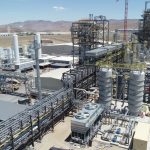
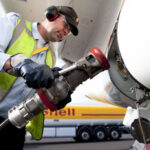





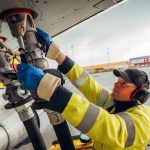
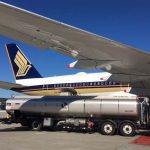

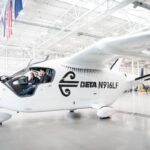

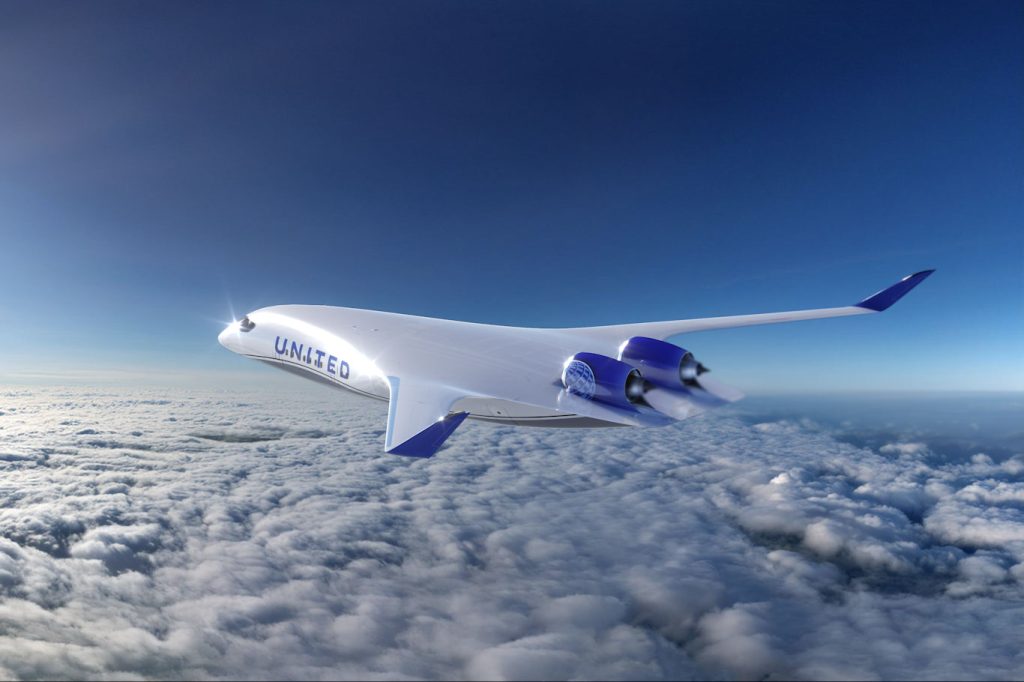


More News & Features
Swiss advanced SAF technology startups Metafuels and Synhelion reach project milestones
PtX fuels have significant Asia-Pacific potential but face many barriers, finds report
Airfreight giants DHL Express and FedEx announce big US SAF deals
EU states to mobilise 500 million euro support for early-mover eSAF production startups
LanzaJet produces first next generation, ethanol-based SAF at flagship Freedom Pines refinery
European Commission announces Sustainable Transport Investment Plan to advance low-and-no-carbon fuels